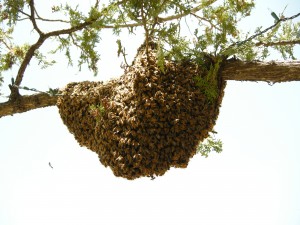Thank you for contacting us! We will be happy to capture and remove swarms of bees.
A swarm of bees is not dangerous, but should be left completely undisturbed (no spraying, no hitting, etc.) They are not there for aggressive reasons. Swarming is a natural method of propagation of a honey bee colony that occurs in response to crowding within the colony. These bees have just been sent out into the world by their colony to find a new home.
In order to not disturb the bees, stay back and keep others away from the swarm. Feel free to observe them from a distance. They are fascinating!
Please contact us ASAP when you see a swarm so we can capture the bees quickly and relocate them to a safe home. Please use the following form to report.
Pictured below is a swarm of bees clumped around the branch of a tree.

Interesting Swarm Facts
– A swarm is made up of mostly worker bees (female) with the queen protected in the center. Swarms vary in size from a few hundred to a many thousands of bees.
– Your swarm has chosen this particular “staging area” to wait while 20-50 of the most experienced scout bees search for a new home.
– The scout bees are flying to and from the swarm “dancing” directions to possible suitable home locations they have found. If you look carefully you
can see them waggling and moving around quickly.
– Once the swarm votes on which home is best, they will gently swirl into the air and fly away.
– Bee swarms can stay put for days (unusual) or fly away in minutes, so contact us right away! Beekeepers know swarms are a gift and will rush to capture them.
– Most beekeepers will house the captured bees in an empty beehive and keep them. Beekeepers provide this service to the community so that local honey bees are managed and kept peacefully. Beekeepers and their productive bees then provide the community with honey, beeswax (candles, lip balm, etc.), pollen (nutritional products), propolis (cosmetics, medicines, varnish, etc.), and royal jelly (medicines, cosmetics).
– You are doing your community and the environment a great service when you post a notice for beekeepers here, and when you protect a swarm of bees from being disturbed until safe capture. For thousands of years people around the world have kept and managed honey bees, so people have become dependent on bees for our food supply and other important staples.
Honeybees populations have dropped quickly and significantly around the world in recent years due to a devastating disease called Colony Collapse Disorder. Beekeepers, farmers and governments worldwide are worried that bees are endangered by household and garden pesticides, and other chemicals, thereby threatening peoples’ food supply.
Note: Once a swarm has moved into a wall, parapet or roof and made a home there, they are difficult to remove. Some beekeepers specialize in removing colonies of bees from structures. This type of removal is time-consuming and can be expensive if walls have to be cut open to remove the bees. For these reasons it is important to report a swarm immediately when you first notice it so the bees don’t become a problem by moving into a structure.
What you can do to help:
1) Please don’t use pesticides of any kind. Learn about alternatives to pesticides at local natural or organic nurseries. (see list on Resources page.)
2) Grow more flowers! Plant locally adapted gardens that both save water and provide flower nectar for bees. Keep your garden organic by learning about easy, cost effective, natural methods of gardening from natural and organic nurseries. (Find out more on Resources page.)
3) Report and protect bee swarms immediately when you find them! Contact local beekeepers for removal. Give bees a chance!
Bees pollinate much of our food. Without honeybees we would have few or no flowering fruits, vegetables, nuts, or spices such as apples, peaches, plums, pears, cherries, chile peppers, coffee, cilantro, squash, onions, avocados, limes, watermelon, strawberries, mustard, beets, cashews, almonds, hazelnuts, cantaloupe, celery, green beans, soy beans, cabbage, Brussels sprouts, cauliflower, broccoli, papaya, passion fruit, tangerines, coconut, cucumber, pumpkins, zucchini, lemons, carrots, cardamom, figs, sapodilla, raspberries, blueberries, cranberries, sesame seeds, sunflowers, macadamia nuts, mangoes, tamarind, allspice, lavender, grapes (wine), and many other foods.
Bees also pollinate other crops that perform vital services to people, including:
– Medicine and nutritional supplements (acerola in Vitamin C, azarole for chronic heart failure, flax for cholesterol and constipation, guar bean reduces fat in foods)
– Animal fodder, especially cattle, and soil improvement (clover, alfalfa, guar beans)
– Increasing corn crop yield (hyacinth bean)
– Commercial baking (guar bean – emulsifier, reduces fat)
– Wood finishing Products (tung tree – oil)
– Ornamental flowers (Honey bees are frequent, happy visitors to roses, sunflowers, lilacs, lavender, and all the most common flower garden plants.)
– Many other uses.
For more information, please watch for updates on the SC Beekeepers website. Thank you for helping us protect the honey bee!
